
The largest municipal workers’ strike in decades in the city of Philadelphia has ended after 9,000 members of AFSCME District Council 33, who are primarily sanitation workers, walked off the job a week ago. Growing piles of trash on the streets of Philadelphia brought the strike into clear view for city residents. Labor historian Francis Ryan says the workers won “the hearts of a lot of Philadelphians” with a popular social media campaign. “What I saw on the picket lines last week was a spark of social justice unionism,” says Ryan. The average sanitation worker salary in Philadelphia is currently $46,000 a year, which the union has argued is not a living wage for workers required to live within the city limits.
Transcript
AMY GOODMAN: This is Democracy Now!, democracynow.org. I’m Amy Goodman.
The largest municipal workers’ strike in decades in the city of Philadelphia has ended. Eight days ago, the 9,000 members of AFSCME District Council 33, who are primarily sanitation workers, walked off the job. Growing piles of trash on the streets of Philly brought the strike into clear view for city residents. The average sanitation worker salary in Philadelphia is currently $46,000 a year, which the union has argued is not a living wage for workers required to live within the city limits. DC 33 President Greg Boulware spoke last week.
GREG BOULWARE: This is about trying to get these working people here, who service the city every day, an adequate raise that actually meets the demands that are required to live inside of the city. That’s all this is about. It’s not about personal things. It’s not about any of the other things. It’s about these members. These members are citizens, first and foremost, of Philadelphia, and they service every aspect across the city and can’t afford themselves to have any decent quality of life inside the city. There’s something wrong with that, and that’s why we’re here, to try to make that change.
AMY GOODMAN: The union also represents 911 dispatchers, water service workers, crossing guards, other city workers. Some of the workers, like the 911 dispatchers, have already been ordered back to work by the court. Support for the workers came from inside and outside Philly. These are two city residents.
PHILADELPHIA RESIDENT 1: Pay these people what they worth. You know what I mean? They’re not worth these pennies y’all are paying them. That’s my views on the strike.
PHILADELPHIA RESIDENT 2: This city is very proud to be blue-collar and hard-working and trade and all that type of pro-union. So, for the people of Philadelphia, you know, if — it sucks that this is what we have to do, but if this is how we got to support, you know, us, this is what we’ve got to do.
AMY GOODMAN: Rapper LL Cool J and singer Jazmine Sullivan refused to cross the picket line last week and perform at the July 4th WAWA Welcome America Festival. This is rapper LL Cool J’s statement to his over 3 million followers on Instagram.
LL COOL J: I understand there’s a lot going on in Philadelphia right now. And, you know, I never, ever, ever want to disappoint my fans, and especially in Philadelphia. Y’all mean too much to me. But there’s absolutely no way that I could perform, cross a picket line and pick up money, when I know that people are out there fighting for a living wage. I’m not doing that.
AMY GOODMAN: And at least three activists with the Philadelphia chapter of the Sunrise Movement were arrested Monday for participating in a peaceful sit-in protest dumping trash at City Hall in solidarity with the striking workers.
REPORTER: Why are you here?
SUNRISE MOVEMENT PROTESTER: Our workers deserve dignity! Cherelle, pay your workers! Meet DC 33’s demands!
AMY GOODMAN: Well, negotiations between the union and Philadelphia ended early this morning at 4 a.m. More details are expected later today.
For more on the historic strike and what led to it, we’re joined by labor historian Francis Ryan, associate professor at Rutgers University, director of Rutgers’ Master of Labor and Employment Relations program. He’s author of the book AFSCME’s Philadelphia Story: Municipal Workers and Urban Power in the Twentieth Century.
This is the first major sanitation strike in a generation, Professor Ryan. You know, I can’t help think back to Memphis 1968, where Dr. Martin Luther King died in the midst of a sanitation workers’ strike, with the signs that the sanitation workers carried, “I am a man.” Professor Ryan, the significance of this strike and it ending today, apparently?
FRANCIS RYAN: Yes, this is the first municipal strike in a generation. And I think the significance of this particular moment is the role that social media has played. I really think that the union won the public relations battle over the past week. And I think this goes back to the pandemic, that the narrative of the essential worker has become so much a part of how especially the younger generation thinks. And it’s clear that, through social media, that there is such wealth disparity in this country, and it is so obvious. And I think that your average Philadelphia citizen, in ways that I don’t think has been done since 1938, when the union was founded, have come out and supported the strikers.
AMY GOODMAN: So, talk about the history of the sanitation workers, how they compare to the police, to the firefighters in Philadelphia.
FRANCIS RYAN: Yes. The union was originally founded back in 1938 and reached their first contract in 1939. It was the first city in the nation to recognize AFSCME as their exclusive bargaining agent. And what I think makes this union so historically significant is that it’s the most powerful interracial union in the city’s history, and it has been able to bridge neighborhoods together, bridge the various sectors within the public workforce, and really make them a force in city politics. And I think, over the years, in my own study of it, what’s clear is that the union has been able to make significant gains in the lives of their members.
And I think that what this strike shows is that the wages that the sanitation workers and crossing guards and water department workers are making is not keeping up with the — with the cost of living. And I think that there is just such frustration on the part of the members, that it led them to walk over the past eight days. And I think that this is a significant moment in its history, because what I saw on the picket lines last week was kind of a spark of social justice unionism, that — you mentioned Dr. King in Memphis in 1968 — I think is the most iconic example of that kind of social justice. And by that, I mean a trade union movement that’s connected to the neighborhoods and to the community centers and to the churches and to students and to all members of the working class, not just members of the particular union. So, I see that as an undercurrent of what happened this past week. And I think that the union, and maybe, hopefully, the entire labor movement in the region, will develop and build on that.
AMY GOODMAN: You talk about social justice, and particularly racial justice. Can you talk about the early representation for Black workers in Philadelphia?
FRANCIS RYAN: Yes. There’s a reason why so many of the sanitation workers and first-line workers, let’s say, in sewage treatment have been African Americans. And that is because in Philadelphia the hiring gate excluded Black men and women from working, let’s say, in the textile industries, in other large industries. So, the one employer that was really open to so many Black workers in Philadelphia was the municipal government. And they took these blue-collar jobs and built lives that way. So, the fact that the union represents these workers historically, you know, it shows the racial dynamics of how the economy has worked, and continues to work, across the country, and certainly in Philadelphia.
AMY GOODMAN: And finally, what do you see coming next? I mean, we just got the rumblings of the end of the deal — the end of the strike this morning at 4:00. There hasn’t even been a news conference yet. Francis Ryan?
FRANCIS RYAN: Right, right. I think that what the union leadership will be doing is they need to convince their members that the contract is the best one that they can get. And it’s the union members themselves, over the next few days, that will vote upon this contract, and it’s really in their hands. So, like every other citizen in the city, we’re waiting to see what the union members do. And I know that the hearts of a lot of Philadelphians are with these workers as they return back to work today.
AMY GOODMAN: Francis Ryan, labor historian, associate professor at Rutgers University, author of AFSCME’s Philadelphia Story: Municipal Workers and Urban Power in the Twentieth Century.
You can go to democracynow.org to see our full-time job offerings for multiple positions, democracynow.org/jobs. I’m Amy Goodman. Thanks so much for joining us.

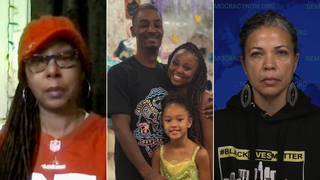
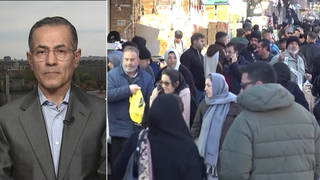
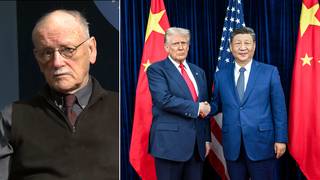

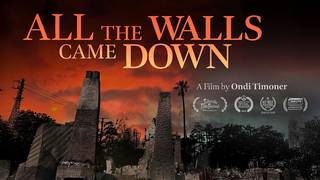
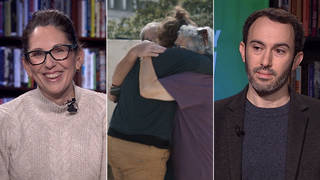


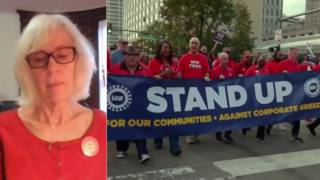

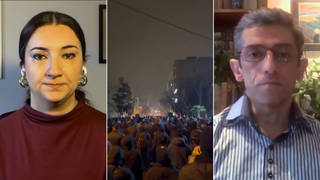
Media Options